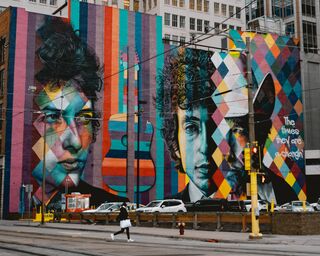Anger
What I Learned Sitting Next to Bob Dylan
And what it can mean for building a kinder society.
Posted December 3, 2021 Reviewed by Tyler Woods
Key points
- Our judgments of others are inconsistent. What would happen if they weren't?
- With famous people we admire, we may cut them slack when they behave badly or, alternatively, vilify them if they fall off our pedestal.
- Learning to treat everyone with empathy, and judge behaviors—rather than people—will help us build a kinder society.
When I was in my twenties, a friend and I went to a Tom Waits performance in Chicago. We had perfect center seats close to the front. But although the theater was packed, the two seats next to us were empty.

As the theater darkened and the performance began, two people entered and took the seats next to us. One was dressed head-to-toe in black leather, and despite the dim lighting, he was wearing sunglasses, which he kept on throughout the performance. During the show, he appeared to be snorting white powder off his knee. I drew conclusions.
I also had all sorts of judgments. Weird was the least of them. Had someone offered to trade seats with us, I would have jumped at the opportunity. What good were great seats with a guy like this next to us? But during intermission, something happened to shift my perspective. A few people behind us began passing this guy their Playbills and asking for an autograph.
We were sitting next to Bob Dylan.
I can be a little starstruck by fame. When I was fifteen I asked William Shatner to kiss me at a Star Trek convention in front of 5,000 people. Also as a teenager, I went backstage pretending I was with People magazine to meet Leonard Nimoy after his Broadway performance in Equus. (I was a Trekkie in case that isn’t obvious.) But my feelings about Bob Dylan were complicated. After all, only moments before, I thought he was creepy. Plus, I'd had a boyfriend in college who screamed the lyrics to Blood on the Tracks at me until I’d memorized the whole album. I thought Dylan was a lyrical genius, but his songs brought back bad memories.
But here’s the thing. While I still had lots of judgments, once I knew who my seat neighbor was I wouldn’t have wanted to trade seats. Now I had a story to tell about sitting next to Bob Dylan, a morality tale about the impacts of fame, entitlement, posturing, and sneaking in late like you don’t want to be noticed and then doing a lot to actually be noticed. If I’d had judgments before knowing this guy was Bob Dylan, they became amplified tenfold.
When famous people disappoint us, we can be relentless in our critiques. When those we put on a pedestal fall, they often crash and shatter. Of course, the opposite can also occur. We may turn a blind eye to bad behaviors when we can’t bear the downfall of our idols. But whichever way the pendulum swings in regard to those who are famous, we are inconsistent in our judgments.
This holds true about our judgments of people in general. For example, think about how you judge people around their actions related to the pandemic. Let’s assume you’re fully-vaccinated (and boosted!). You avoid unmasked indoor gatherings. You make choices to protect your community. Now, imagine that you have a friend who is simpatico with you in most ways, but who hasn’t been vaccinated because they are wary of the speed of the development of the vaccines and don't trust the new technologies used. They’ve shared these concerns with you. You don’t agree, but you love them. You may judge their choice, but not so harshly that you judge them as a person or express anything mean-spirited.
Now, let’s imagine that instead of a friend, you read the same concerns expressed on social media by a person you don’t know. That person’s feed is full of other comments that reflect a different political bent from your own. You don’t agree with them about much of anything. You’re ready to give them an earful, perhaps not directly (though maybe), but certainly in your head. You’re full of disdain.
What happens if this person is famous and you don’t like them? They’re sharing their perspectives to a wide audience, and now you’re full of contempt for this anti-science anti-vaxxer. You may even be ranting because your disagreement has morphed into rage.
If, however, you idolize this famous person, they may tumble off your pedestal, but you probably won’t feel rage. More likely you’ll feel great disappointment. If your “relationship” to this famous person is complicated—as mine was with Bob Dylan—you may find that your response lands somewhere between condescending and snide.
In other words, our feelings about the very same behaviors depend on our feelings about the people in question, as well as their relative “importance” in the world.
But what would it be like to treat everyone with the same compassion we would show a friend? What would it be like to judge behaviors consistently, with a lens of empathy and without differentiating based on our perceptions of the person involved?
This isn’t to say that judging behaviors is bad or wrong. We should judge behaviors that cause harm and suffering, but that doesn’t mean we should judge the people themselves. I judged Bob Dylan’s leather outfit because I know how cruelly we treat cows, but I didn’t need to judge him. I judged his actions during the show because they were distracting, and I felt self-righteous, but I didn’t need to judge how one of the most iconic figures of our time chose to enter a theater.
Reflecting upon that night sitting next to Bob Dylan, I’m chagrined. I realize now that I used the experience to spin a particular story and to judge a person whose music has had a profoundly positive impact on several generations of people. Most of us do this to some degree. But what if we didn’t? What if we were kinder? What if we treated everyone the way we treat our friends?




